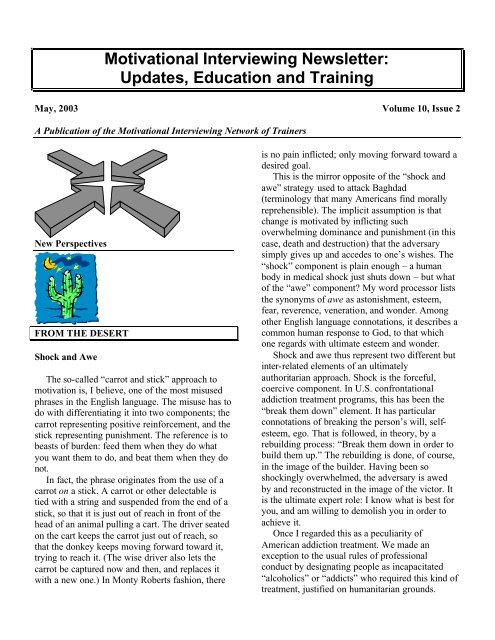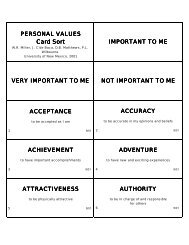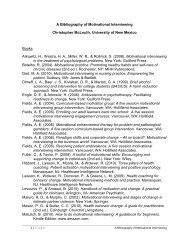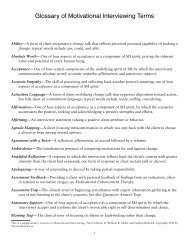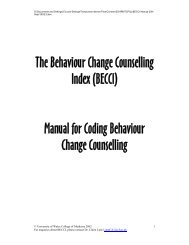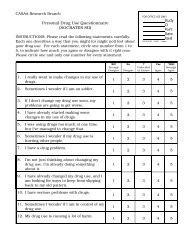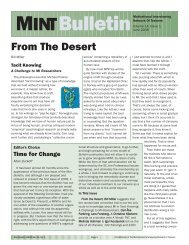Motivational Interviewing Newsletter: Updates, Education and Training
Motivational Interviewing Newsletter: Updates, Education and Training
Motivational Interviewing Newsletter: Updates, Education and Training
You also want an ePaper? Increase the reach of your titles
YUMPU automatically turns print PDFs into web optimized ePapers that Google loves.
<strong>Motivational</strong> <strong>Interviewing</strong> <strong>Newsletter</strong>:<br />
<strong>Updates</strong>, <strong>Education</strong> <strong>and</strong> <strong>Training</strong><br />
May, 2003 Volume 10, Issue 2<br />
A Publication of the <strong>Motivational</strong> <strong>Interviewing</strong> Network of Trainers<br />
New Perspectives<br />
FROM THE DESERT<br />
Shock <strong>and</strong> Awe<br />
The so-called “carrot <strong>and</strong> stick” approach to<br />
motivation is, I believe, one of the most misused<br />
phrases in the English language. The misuse has to<br />
do with differentiating it into two components; the<br />
carrot representing positive reinforcement, <strong>and</strong> the<br />
stick representing punishment. The reference is to<br />
beasts of burden: feed them when they do what<br />
you want them to do, <strong>and</strong> beat them when they do<br />
not.<br />
In fact, the phrase originates from the use of a<br />
carrot on a stick. A carrot or other delectable is<br />
tied with a string <strong>and</strong> suspended from the end of a<br />
stick, so that it is just out of reach in front of the<br />
head of an animal pulling a cart. The driver seated<br />
on the cart keeps the carrot just out of reach, so<br />
that the donkey keeps moving forward toward it,<br />
trying to reach it. (The wise driver also lets the<br />
carrot be captured now <strong>and</strong> then, <strong>and</strong> replaces it<br />
with a new one.) In Monty Roberts fashion, there<br />
is no pain inflicted; only moving forward toward a<br />
desired goal.<br />
This is the mirror opposite of the “shock <strong>and</strong><br />
awe” strategy used to attack Baghdad<br />
(terminology that many Americans find morally<br />
reprehensible). The implicit assumption is that<br />
change is motivated by inflicting such<br />
overwhelming dominance <strong>and</strong> punishment (in this<br />
case, death <strong>and</strong> destruction) that the adversary<br />
simply gives up <strong>and</strong> accedes to one’s wishes. The<br />
“shock” component is plain enough – a human<br />
body in medical shock just shuts down – but what<br />
of the “awe” component? My word processor lists<br />
the synonyms of awe as astonishment, esteem,<br />
fear, reverence, veneration, <strong>and</strong> wonder. Among<br />
other English language connotations, it describes a<br />
common human response to God, to that which<br />
one regards with ultimate esteem <strong>and</strong> wonder.<br />
Shock <strong>and</strong> awe thus represent two different but<br />
inter-related elements of an ultimately<br />
authoritarian approach. Shock is the forceful,<br />
coercive component. In U.S. confrontational<br />
addiction treatment programs, this has been the<br />
“break them down” element. It has particular<br />
connotations of breaking the person’s will, selfesteem,<br />
ego. That is followed, in theory, by a<br />
rebuilding process: “Break them down in order to<br />
build them up.” The rebuilding is done, of course,<br />
in the image of the builder. Having been so<br />
shockingly overwhelmed, the adversary is awed<br />
by <strong>and</strong> reconstructed in the image of the victor. It<br />
is the ultimate expert role: I know what is best for<br />
you, <strong>and</strong> am willing to demolish you in order to<br />
achieve it.<br />
Once I regarded this as a peculiarity of<br />
American addiction treatment. We made an<br />
exception to the usual rules of professional<br />
conduct by designating people as incapacitated<br />
“alcoholics” or “addicts” who required this kind of<br />
treatment, justified on humanitarian grounds.
MINUET (2003) Vol. 10, No. 2<br />
Certainly Synanon <strong>and</strong> the related “therapeutic”<br />
communities provide a naked example of such<br />
authoritarianism at work. Now I underst<strong>and</strong> this as<br />
a much more generalized disposition toward other<br />
human beings: that they are misguided <strong>and</strong> need to<br />
be either destroyed or remade in our own image.<br />
Within my favorite source of analogies, Star Trek,<br />
this is the fictional Borg race that “assimilates” all<br />
other species by devastating <strong>and</strong> then rendering<br />
them automatons subservient to a single<br />
communal consciousness. The historical real-life<br />
examples are legion. In fiction <strong>and</strong> in real life, this<br />
authoritarian approach is in tension with an<br />
opposite disposition that honors autonomy,<br />
represented in Star Trek as a “prime directive” of<br />
non-interference with established societies.<br />
As Steve <strong>and</strong> I have sought to describe it, the<br />
underlying spirit of motivational interviewing<br />
embodies respect for autonomy, <strong>and</strong> fosters a<br />
collaborative approach. For me this is<br />
complemented by an awe for the positive, creative,<br />
enduring qualities of human spirit. I do choose to<br />
believe, as Rogers did, that there is an inherent<br />
natural tendency for individuals to evolve in a<br />
positive, healthy, pro-social direction given the<br />
right conditions of acceptance <strong>and</strong> support. The<br />
ancient Greek term is teleo – to grow toward one’s<br />
natural, mature, perfected form. It is consistent<br />
with the notion of a seed within each of us, an<br />
intended natural self that may or may not be<br />
realized. (When Christian scripture enjoins one to<br />
“be perfect”, the translation is usually from forms<br />
of the Greek teleo. To be “perfect” in this sense is<br />
quite different from being 100% conformed to<br />
rules. It is to be matured, to be grown into that for<br />
which one was intended. The dying words of<br />
Jesus, “It is finished,” derive from the same verb:<br />
It is perfectly complete.)<br />
Although humanistic <strong>and</strong> existential traditions<br />
have much in common, here is an important point<br />
at which they differ. Existentialism assumes no<br />
absolutes, no given, latent, natural self. The only<br />
meaning or identity a person has is that which is<br />
chosen or created. The human potential movement<br />
of Maslow <strong>and</strong> Rogers started from a<br />
fundamentally different assumption: that there is<br />
this natural potential in human beings with both<br />
common <strong>and</strong> unique elements. I suspect (<strong>and</strong>, of<br />
course, honor) that MINTies vary widely along<br />
this humanistic-existential continuum.<br />
Both existential <strong>and</strong> humanistic perspectives<br />
view the process of psychotherapy as collaborative<br />
<strong>and</strong> companionable. Both are evocative. The<br />
humanistic therapist aims to help the client<br />
discover meaning; the existential therapist aspires<br />
to help the client create it. In this regard they are<br />
similar, <strong>and</strong> motivational interviewing lies<br />
squarely within this “third force” disposition of<br />
psychology. In practice, MI draws upon both<br />
cognitive (e.g., reframing) <strong>and</strong> behavioral methods<br />
(e.g., differential reinforcement), but in spirit MI is<br />
unmistakably part of the humanistic-existential<br />
tradition in which awe is reserved not for one’s<br />
own wisdom, but for that in the other which is yet<br />
to be born.<br />
Milestones for <strong>Training</strong><br />
I would like to suggest a series of places where<br />
people seem to get stuck in learning MI, as a<br />
possible agenda to guide training <strong>and</strong> supervision.<br />
They occur in a reasonably consistent order, so<br />
that as trainees pass one they often encounter the<br />
next obstacle. This is, as always, a work in<br />
progress, <strong>and</strong> suggestions are welcome.<br />
1. Menschenbild. An initial point of difficulty has<br />
to do with openness to the underlying assumptions<br />
of MI. I considered stating this as “underst<strong>and</strong>ing”<br />
or “accepting” the underlying assumptions, but I<br />
don’t think it has to go that far. Without at least a<br />
willingness to consider MI as a possible frame of<br />
reference, however, it is difficult to get further. “It<br />
won’t work with my clients” may bespeak a view<br />
of one’s clients that is incompatible with the spirit<br />
<strong>and</strong> practice of MI. The task here is to help the<br />
trainee suspend docere, at least long enough to<br />
experiment with ducere.<br />
2. Empathy. A second milestone is to develop<br />
facility with reflective listening. Without the skill<br />
of accurate empathy, <strong>and</strong> of OARS more<br />
generally, one can go no further in learning <strong>and</strong><br />
practicing MI. That is why I have given such<br />
attention to reflective listening in MI training. I<br />
believe that OARS are fundamental.<br />
2
MINUET (2003) Vol. 10, No. 2<br />
3. Recognizing Change Talk. In order to move<br />
beyond reflective listening in MI, the next step is<br />
to be able to recognize change talk. Unless you<br />
know change talk when you hear it, you won’t be<br />
able to evoke <strong>and</strong> reinforce it. With the new<br />
discoveries of Paul Amrhein, this step has been<br />
refined to recognizing Desire, Ability, Reasons,<br />
<strong>and</strong> Need language.<br />
4. Evoking <strong>and</strong> Strengthening Change Talk.<br />
Being able to recognize change talk, the next<br />
hurdle is to learn how to call it forth <strong>and</strong> reinforce<br />
it. Here the directive component of MI is<br />
introduced. This involves an additional set of<br />
skills; in particular, learning how to use OARS<br />
differentially, to row in a particular direction.<br />
5. Collecting Bouquets. Responding to change<br />
statements with immediate reflection is one step.<br />
Another important skill is to collect them into or<br />
summaries. Putting together the desire, ability,<br />
reasons <strong>and</strong> need stems into bouquets is, I believe,<br />
an important skill for resolving ambivalence in the<br />
direction of change. It is in seeing all of this<br />
together, simultaneously, that the person’s<br />
perception shifts toward change.<br />
6. Rolling with Resistance. It is fine <strong>and</strong> good to<br />
know how to evoke, reinforce, <strong>and</strong> summarize<br />
change talk. One also needs, however, an MIconsistent<br />
way of recognizing <strong>and</strong> responding to<br />
counter-change talk when it occurs, in order to<br />
reduce commitment to the status quo<br />
(“resistance”). The component skills are largely<br />
the same; it’s a matter of using them to decrease<br />
rather than increase thematic material (e.g.,<br />
amplified versus understated reflection).<br />
commitment does not yield behavior change.<br />
Premature press for commitment undermines<br />
behavior change.<br />
8. Transition to Other Therapeutic Methods.<br />
Finally, once one has negotiated Phase 2, there is<br />
usually a shift into a more directed therapeutic<br />
process if treatment is to continue into a Phase 3.<br />
Once the client arrives at the action stage, the<br />
therapist often needs more than Rogers. It is also<br />
worth emphasizing that some clients arrive in<br />
therapy already at the action stage, <strong>and</strong> probably<br />
need little or no MI in order to get started. Relying<br />
on reflection alone can be counterproductive.<br />
(When you are wheeled into the emergency<br />
department of a hospital, you want your doctor to<br />
do more than say, “Ooh, I imagine that hurts.”)<br />
We have seen therapists who were terrific at MI,<br />
who then had trouble negotiating the shift into a<br />
different <strong>and</strong> more directed phase.<br />
In a way, these eight hurdles provide a broad<br />
outline for training. They are not going to be<br />
accomplished in a workshop, but can guide the<br />
process of training <strong>and</strong> supervision. When you are<br />
working with an individual or group over time,<br />
determining where each person is in the<br />
acquisition of these skills may provide clearer<br />
guidelines for where to focus training efforts next.<br />
7. Evoking <strong>and</strong> Strengthening Commitment. In<br />
terms of specific skill development, Phase 2 has<br />
been most neglected in MI to date. From Paul<br />
Amrhein’s work, it is clear that an interviewer<br />
needs to differentiate Commitment from other<br />
forms of change talk. How does one know when to<br />
move from Phase 1 (desire, ability, reasons <strong>and</strong><br />
need) to Phase 2 (commitment)? One needs skills<br />
for testing this transition, knowing whether <strong>and</strong><br />
how to proceed with evoking commitment to a<br />
change goal <strong>and</strong> plan. Change talk without<br />
3
MINUET (2003) Vol. 10, No. 2<br />
“If…” – A way of broaching the subject<br />
without creating resistance…<br />
If I were a rich man…<br />
Carl Åke Farbring<br />
Fiddler on the roof<br />
As MI counselors <strong>and</strong> trainers we all know that<br />
premature talk about planning what clients need to<br />
do usually creates resistance. Very clearly the<br />
level of commitment in Paul Amrhein’s research<br />
drops as the client is asked to go from previous<br />
change talk into explicit planning in DO-language;<br />
for those who have already made positive<br />
statements to change the level of frequency <strong>and</strong><br />
strength drops dramatically. Bill concludes that<br />
this is a hazard with manuals when you go ahead<br />
without listening to where clients are <strong>and</strong> this may<br />
be an explanation why Project Match did not<br />
produce expected results. (MINUET, November<br />
2002). A sudden drop of change talk <strong>and</strong> intensity<br />
of DO-language may be interpreted as resistance.<br />
This is an important message for us <strong>and</strong> for our<br />
work with clients. In corrections, where I work, a<br />
treatment plan is m<strong>and</strong>atory <strong>and</strong> a necessary<br />
routine in the work of prison officers <strong>and</strong><br />
probation officers <strong>and</strong> we have been working a lot<br />
with manuals lately. So what can we do? Do we<br />
have to wait until we feel the client is ready? Is it<br />
all up to intuition <strong>and</strong> timing? My practical<br />
experience with clients tells me that there is a way<br />
out.<br />
Do you remember the feeling you experienced<br />
when you were dreaming of everything you would<br />
do if you won a million: “If I were a rich man…”<br />
You were planning lots of things even though they<br />
were not real. Depending on the situation they<br />
were, of course, more or less realistic but<br />
contained nevertheless often a solution to<br />
immediate problems <strong>and</strong> there was also a positive<br />
feeling linked to it, sometimes even euphoric. The<br />
question is – can you use this method also with<br />
clients <strong>and</strong> make them think <strong>and</strong> talk about<br />
planning without feeling forced go through with<br />
their plans? And is it possible that if-planning will<br />
maintain or even increase previous levels of<br />
frequency <strong>and</strong> intensity of DO-language <strong>and</strong> avoid<br />
the emergence of resistance?<br />
I have used this method often with my clients<br />
<strong>and</strong> though I have no empirical data to back it up I<br />
have found it useful <strong>and</strong> I frequently recommend<br />
probation officers in our service to use it. Clients<br />
often like elaborating on if-planning, experience<br />
cognitive structuring on the way <strong>and</strong> hopefully<br />
learn something from it.<br />
John, I know you don’t feel quite ready yet to<br />
make plans to move out from your neighbourhood<br />
where it seems difficult for you to stay away from<br />
crime, but if you did, what would be the best<br />
option for you <strong>and</strong> how would you benefit from it?<br />
Maybe it’s a bit early, Michael, for you to think<br />
of the harmful effects of your use of heroin, but if<br />
you did how would you go about it? What would<br />
be the best way for you personally to bring about<br />
change here?<br />
So Peter, in a way it is still important for you to<br />
use drugs together with your friends but if you<br />
suddenly would feel that it wasn’t worth it<br />
anymore – how could you tell or make it clear to<br />
your friends <strong>and</strong> make them respect your<br />
decision?<br />
There is a clear difference in that way of<br />
bringing up the subject of planning <strong>and</strong> this:<br />
So now Richard it’s time for us to make a plan for<br />
you. What kind of plan do you want to make in<br />
order for you to stop using drugs…<br />
To me it’s quite obvious that this way of<br />
bringing up the subject will increase resistance<br />
even with clients who have started thinking about<br />
change.<br />
In ordinary conversation we use a lot of “ifs”. I<br />
think we could use it also with clients with the<br />
explicit purpose to elicit ideas about change<br />
without creating resistance.<br />
4
MINUET (2003) Vol. 10, No. 2<br />
FROM OLD EUROPE<br />
Unpopular, disliked <strong>and</strong> frustrating research<br />
findings: II. Dressed to listen<br />
In a previous issue I presented our findings on<br />
personality correlates of inflated self-efficacy<br />
ratings: How do we change the expectancies of our<br />
clients if self-efficacy is strongly related to personality?<br />
However, here is another unpopular,<br />
disliked <strong>and</strong> frustrating research finding from our<br />
lab.<br />
In order to determine the effects of our MI<br />
trainings for general practitioners we developed a<br />
German-language scale assessing patientcenteredness<br />
(Don’t BASH: Brief Assessment of<br />
Shared Decision Making in Health Care). During<br />
an early phase of scale development we asked MI<br />
experts as well as undergraduate students to evaluate<br />
transcripts of encounters with st<strong>and</strong>ardized<br />
patients.<br />
With one exception all transcripts rated by the<br />
undergraduates had been carefully masked with<br />
regard to the GP’s gender. Guess what happened?<br />
Unmasking one transcript changed the rankings<br />
dramatically in favour of the – less patientcentered<br />
– female GP (can’t avoid a stupid<br />
smirk…). Meanwhile we have finished a study on<br />
gender effects in practitioner-patient communication<br />
(Hagen, Demmel, Nicolai, Zimmer & Rist,<br />
2003). We presented transcripts of encounters with<br />
male <strong>and</strong> female GPs to 89 undergraduate students<br />
<strong>and</strong> faked the gender. The study revealed a halo<br />
effect: nearly all participants favoured the<br />
“female” GPs (F(1, 509) = 46.88, p < .001). Most<br />
frustrating, “gender” did not interact with<br />
“performance” in terms of expert’s empathy<br />
ratings. Shall we stop training females? However,<br />
we have to demonstrate the external validity of<br />
these findings…<br />
50<br />
Male GPs<br />
Female GPs<br />
45<br />
BASH Total Score<br />
40<br />
35<br />
30<br />
True Gender<br />
Faked Gender<br />
5
MINUET (2003) Vol. 10, No. 2<br />
Sag’ beim Abschied leise Servus…<br />
Probably, in 2004 a new editor will take over.<br />
It’s been a pleasure to edit the newsletter <strong>and</strong> to<br />
correspond with MINTies from all over the world:<br />
Thanks a lot!<br />
What about the future of the newsletter? Will<br />
we find an enthusiastic new editor? The listserv is<br />
flourishing (Chris Wagner is doing a great job).<br />
Are we still in need of a second – public –<br />
discussion forum? Do we need a peer-reviewed<br />
journal? Personally, I don’t want to miss Bill’s<br />
notes from the desert <strong>and</strong> all the other pieces from<br />
Steve, Carl, David…<br />
References<br />
Hagen, J., Demmel, R., Nicolai, J., Zimmer, V., & Rist,<br />
F. (2003, May). Entwicklung einer deutschsprachigen Skala<br />
zur Erfassung des Beh<strong>and</strong>lungsstils in der medizinischen und<br />
psychosozialen Versorgung. Poster presented at the annual<br />
meet ing of the Fachgruppe Klinische Psychologie und<br />
Psychotherapie der Deutschen Gesellschaft für Psychologie.<br />
Something completely different…<br />
Some weeks ago I bought the new CD by Bill<br />
Frisell (http://www.billfrisell.com): The<br />
Intercontinentals (a recording with musicians from<br />
Brazil, Mali, the US <strong>and</strong> – Greece). I listened to<br />
the CD while finishing 5-minute tasks (e-mails,<br />
letters etc.). When track five started I stopped<br />
writing, searched for the booklet <strong>and</strong> looked up the<br />
title of the piece: “Listen” … Have you ever been<br />
to a concert of this brilliant musician?<br />
All the best,<br />
Ralf<br />
Authors: R. Demmel, C. Å. Farbring, W. R. Miller<br />
_______________________________________________________________________________________<br />
Inquiries <strong>and</strong> submissions for this newsletter should be forwarded to:<br />
Ralf Demmel, Ph.D.<br />
University of Münster, Department of Clinical Psychology<br />
Fliednerstr. 21, 48149 Münster, Germany<br />
e-mail: demmel@psy.uni-muenster.de<br />
This newsletter is a free publication made available to members of the <strong>Motivational</strong> <strong>Interviewing</strong><br />
Network of Trainers.<br />
6


